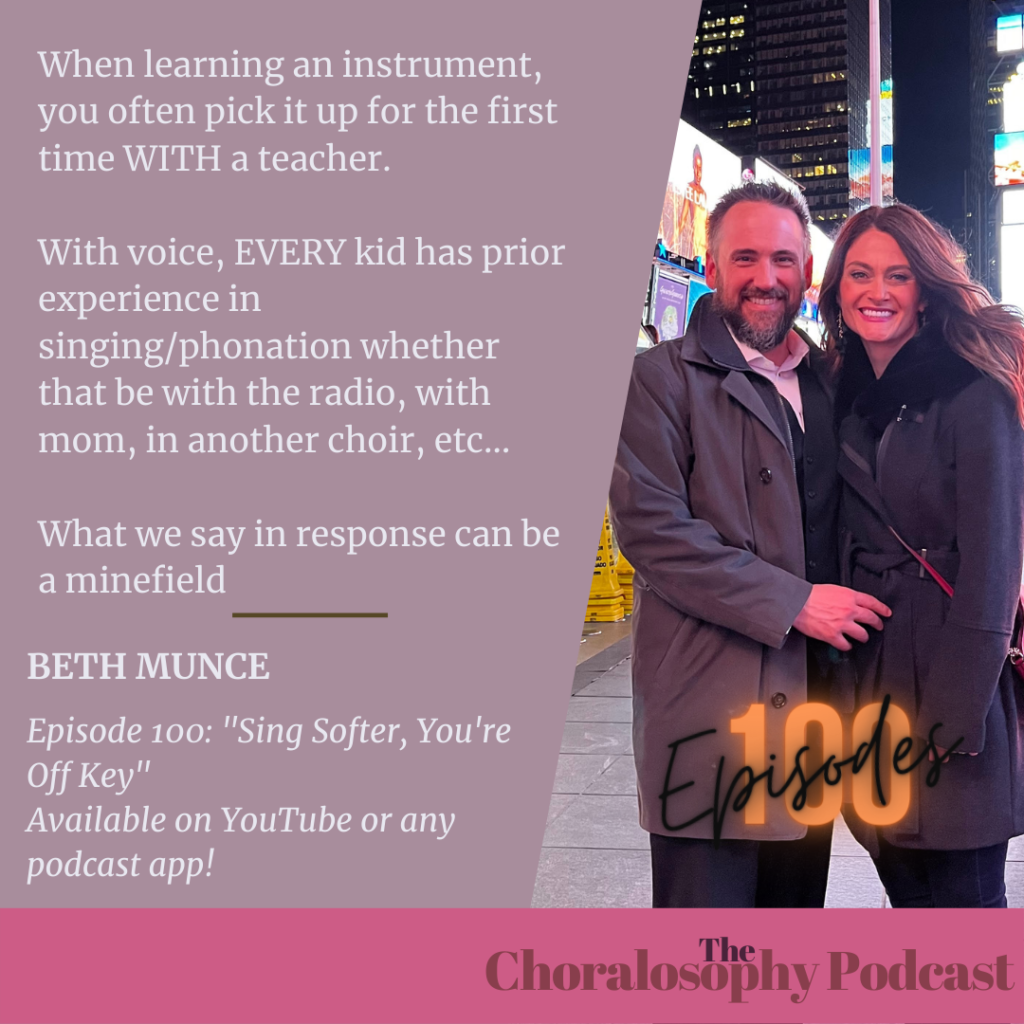This episode is a milestone. The 100th full length episode of the podcast. Since my wife Beth was the FIRST guest on the show, I thought it would be good to go full circle, and bring her on again!
Being a music teacher is an important job. It is, or should be about SO MUCH more than the “collection and curation of musicians who are already good.” But how often is that our quickest route to career success? In this episode Beth and I take the gloves off and dive into the topic of the ways in which choir directors of all levels, with all of the best intentions, can often say or do things that either do not help singers become better, or even make the singer worse. “Raise the soft palette” when the problem is actually tongue tension. “Blend!
when the result is actually just removing resonance so you can no longer hear the problem. “Open your mouth to the size of the 3 Oreos” when every mouth is a different size, and much more.
We also go a bit hard on the problems with ranking, or rating competitions for beginning singers. The systems, often governed by the same organization that governs basketball games in many places, can actually disincentivize quality feedback for singers.
You can listen from the widgets below which will take you to Apple or Castbox to finish listening, or you can find the show on Google Play, Spotify, Youtube or Stitcher!
The Unique Nature of Singing by Beth Munce
While many of my singing and teaching of singing philosophies and approaches have shifted or changed…some I would completely redo differently if I had the chance…one that hasn’t (and this is a hill that I will die on) is that there is a place in music for EVERYONE.
The unique nature of singing is that 1) we all have a different instrument: everyone’s lung capacity, torso length, pharyngeal shape, tongue size, etc…are all different!! So there is not a one size fits all approach to singing. It is different for everyone. And everyone learns differently! Add that into the mix. Plus every person has to learn how to coordinate their muscles, where to feel resonance, how to learn to resonate effectively and efficiently, and how to adjust this approach when their bodies and hormones are changing. It’s a lot! Plus, 2) unlike starting piano or band where the first time you pick up an instrument is with your teacher (where they can tell you “put this hand here, this finger here…”) in choir, EVERY kid has prior experience in singing/phonation whether that be with the radio, with mom, in another choir, etc…some of these habits are good, some detrimental (don’t get me started on some of the bad singing examples on the radio!). The point being, you are having to redirect those already insulated neural pathways. Retrain those muscles. And this takes time and concerted effort. Some kids give up and don’t want to put forth the effort. I tell my students that learning to sing is like you are renovating a home as opposed to building one from scratch. And some houses need more work than others! 
Some of my proudest moments in teaching have been the kid whose mom thought he was “tone deaf” and he ended up being able to perform a solo successfully and make concert choir to be with his buddies…the girl who was the only one of her peers who auditioned for an honor choir her sophomore year and didn’t make it, who went on to make All-State choir her senior year…the boy who was so awkward and shy and could barely make a peep who went on to get a full ride scholarship in vocal performance and has had an active adult performance career. Those stories of hard work and perseverance are my favorite. The kid that didn’t think they could or was the underdog who worked their butt off and ended up excelling!!
Beth’s previous appearances on the Podcast
Episode 1: Health Happiness and Balance for the Choral Director
Episode 8: Renovating the Voice
Episode 25: Loving by Letting Go with Jaclyn Johnson (Beth as Co



Leave a Reply
You must be logged in to post a comment.